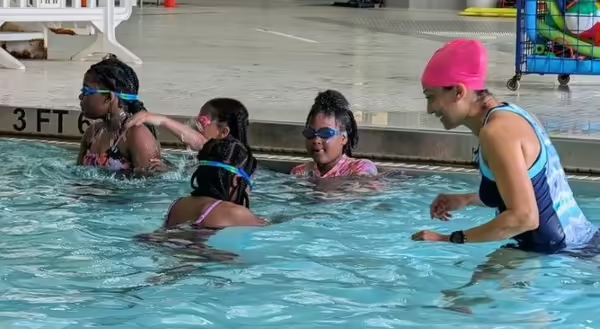
It’s summertime! The days are hot, and the local swimming pool is jam packed with kids and adults alike making a splash and staying cool. While the pool can offer a fun summer day for the whole family, unfortunately, not everyone is comfortable at the pool or safe around the water.
Disparities in swimming
Over half of all adults in the U.S. have never taken a swimming lesson, and there are differences between different groups of people. About 63% of Black adults and 72% of Hispanic adults in the U.S. have never taken a swimming lesson. According to the CDC, while about 15% of all adults do not know how to swim, a much higher proportion of Black adults – over one third – report not knowing how to swim. These differences likely exist due to structural racism that impacts access to pools and swim lessons and societal and cultural norms around swimming. When parents do not know how to swim, their children are also less likely to know how to swim.
Sadly, drowning is the number one cause of death in children ages one to four. Older children and youth are also at risk of drowning. In fact, Black children ages 10-14 have the highest drowning rate and are more than 7.5 times as likely to drown in a swimming pool compared to white children of the same age. Due to pool closures and lifeguard shortages associated with the COVID-19 pandemic, the number of drownings has increased significantly in the last few years, especially among Black children.
Importance of swim lessons
Swimming is the only sport or recreational activity that can also save your life. Simply put, children who participate in swim lessons have a lower risk of drowning. It’s important for children to engage in swim lessons that teach water safety as well as basic swimming skills. Swim lessons help to develop lifelong skills. Children who know how to swim and feel confident around the water can enjoy playing in the pool with friends or even go on to compete in swimming, diving, water polo, artistic swimming, or other water-based sports. As adults, swimming laps or participating in various aquatic fitness classes provides a low-impact option for engaging in exercise, especially for those with arthritis.
Dr. Latashia Key, who recently completed her doctoral degree in Recreation, Sport and Tourism from the University of Illinois, can personally attest to the importance of learning to swim. After a near-drowning incident as a child, Dr. Key became an American Red Cross lifeguard and Water Safety Instructor. She has competed in swimming, triathlon, and even dipped her toes in the world of artistic swimming. Professionally, Dr. Key spent some time working as an Aquatics Director and leading aquatic fitness classes before pursuing her graduate studies.
S.A.F.E. Kids Swim™ program
While completing her PhD at the University of Illinois, Dr. Key was inspired by her own swimming journey to address the disparities in and around the pool by developing a culturally aware swim lesson and water safety program for Black youth. Dr. Key’s program focuses on reducing drowning rates, increasing water competency skills, and increasing physical activity to empower Black youth to have confidence in the water.
The program, called S.A.F.E. (Strong, Amazing, Fearless and Empowered) Kids Swim™, uses a culturally inclusive approach to swim lessons and water safety. Safe Kids Swim™ includes the following key elements:
- Instructors who “look like” the swimmers
- Other swimmers who “look like” the participants
- Support from the parents
- A welcoming environment that feels safe to learn and build confidence in the water
- Highlighting Black trailblazers in swimming and aquatics
Dr. Key shared the impact she saw from the Safe Kids Swim™ program, saying that “representation really does matter. It’s showing Black youth they can learn more than basic water safety and swimming skills; they can also see and learn that there are individuals who look like them achieving their goals in various areas of aquatics. My mission with Safe Kids Swim™ is to plant that seed and guide them towards success.”
Get started today
Swimming is a lifelong skill, and all kids deserve access to learn how to swim and feel safe and confident around the water. It’s essential for swim lessons to be culturally tailored, affordable, and accessible. Look for scholarship and low-cost options at your local park district or YMCA or a program like Safe Kids Swim™ or Black Kids Swim to ensure your family can safely enjoy the pool this summer and for years to come!
Resources
- U.S. Centers for Disease Control and Prevention Guidelines for Healthy and Safe Swimming
- YMCA Water Safety and Swimming
- U.S. Consumer Product Safety Commission Pool Safely
- Black Kids Swim
About the authors
Dr. Latashia Key recently graduated from University of Illinois Urbana-Champaign with a doctoral degree in Recreation, Sport and Tourism. She is passionate about helping to reduce drowning rates among youth, especially Black youth. Dr. Key is excited to continue this impactful and important work, one lesson at a time as a newly hired faculty member at Louisiana State University. To learn more about S.A.F.E. Kids Swim™, email Dr. Latashia Key at lkey3@lsu.edu
Caitlin Fredericks is a statewide Physical Health Specialist. As part of the Integrated Health Disparities program, she provides education, programs, and resources to reduce health disparities in physical health. She is an ACSM certified personal trainer and an ACE certified group fitness instructor. Caitlin has diverse experience working at the intersection of education and physical activity and is actively collaborating with local coalitions to strengthen our community. The Integrated Health Disparities program tackles health issues with an integrated lens of physical, mental, and community health providing programs and resources to address health inequities.